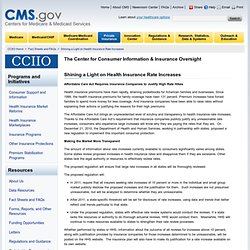

SEMO Insurance
Life/Health Insurance in MO. 573-546-7676
HealthCare.gov. PCIP.gov - Home. Timeline of the Affordable Care Act. Accountable Care Organizations for Original Medicare. Summary The Patient Protection and Affordable Care Act contains provisions surrounding the establishment of Accountable Care Organizations (ACOs) under the Medicare Shared Savings Program. Under the final rule issued by the Centers for Medicare & Medicaid Services (CMS) on Oct. 20, 2011, ACOs – a group of physicians, hospitals and other health care professionals working together – would coordinate care and share in certain savings or losses for Medicare beneficiaries assigned to it in an attempt to improve results for patients with original (fee-for-service) Medicare – Medicare Parts A and B.
The rule does not cover Medicare Advantage plans, Medicaid or commercial insurance. The Medicare Shared Savings Program would reward ACOs that lower health care costs for Medicare beneficiaries (by allowing the ACO to share in certain savings) while also meeting performance standards on quality of care and other measures. Quality Standards Groups of Providers Eligible to Participate Timing. United for Reform Resource Center. HealthReformGlossary.pdf (application/pdf Object) Health Reform Provisions. Pre-Existing Conditions Under Age 19. Summary Beginning Sept. 23, 2010, group health plans cannot exclude enrollees (employees, spouses or dependents) under age 19 based on pre-existing conditions. For other plans, all pre-existing condition exclusions must be removed beginning in 2014. Grandfathered group health plans receive no special protection and must comply once the provision becomes effective with respect to the plan.
These rules apply equally to collectively bargained and non-collectively bargained plans. A special rule applies to individual health insurance coverage. A temporary high-risk health insurance pool provides coverage for eligible individuals who have been denied health care coverage. For More Information Frequently Asked Questions UnitedHealthcare is using selected plan year renewal on or after 9-23-10 (which normally coincides with the ERISA plan year) to implement the changes for healthcare reform.
The law includes any enrollee under the plan who is under 19. Health Benefit Exchanges. Summary The Affordable Care Act (ACA) introduces a new option for small business employers and individuals to access health insurance, called Health Benefit Exchanges, or Health Insurance Marketplaces. These online Marketplaces are established in each state and provide another way to research, compare and enroll in health insurance offered by health insurers. There are also two types of Marketplaces within each state. One is the Individual Marketplace, where individuals can shop for insurance.
And the other is for small business employers, called the SHOP Marketplace, short for Small Business Health Options Program. The initial open enrollment period for plans offered through the Individual Marketplaces starts October 1, 2013, and ends March 31, 2014. In 2014-2016, only individuals and small group employers are eligible to participate in the Marketplaces; beginning in 2017, states may permit employers in the large group market to participate. Small business tax credit. Essential Health Benefits. MixedBenefits.pdf (application/pdf Object)
FI_EssentialBenefits.pdf (application/pdf Object) EssentialHealthBenefitsFAQ.pdf (application/pdf Object) Essential_health_benefits_bulletin.pdf (application/pdf Object) SelfInsuredEssentialBenefits.pdf (application/pdf Object) Preventive Care. Affordable Care Act Rules on Expanding Access to Preventive Services for Women. Affordable Care Act Requires Insurance Companies to Justify High Rate Hikes Health insurance premiums have risen rapidly, straining pocketbooks for American families and businesses.

Since 1999, the health insurance premiums for family coverage have risen 131 percent. Premium increases have forced families to spend more money for less coverage. And insurance companies have been able to raise rates without explaining their actions or justifying the reasons for their high premiums. The Affordable Care Act brings an unprecedented level of scrutiny and transparency to health insurance rate increases. Making the Market More Transparent The amount of information about rate increases currently available to consumers significantly varies among states. The proposed regulation will ensure that large rate increases in all states will be thoroughly reviewed. The proposed regulation will: This regulation builds on the Affordable Care Act’s efforts to strengthen state rate review efforts. Medicare Info. Help.